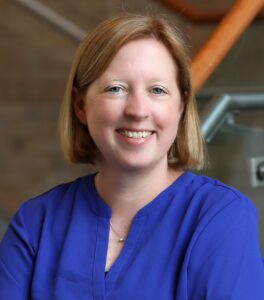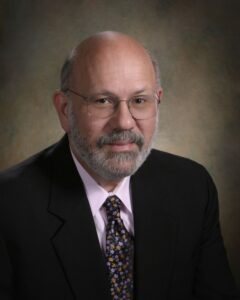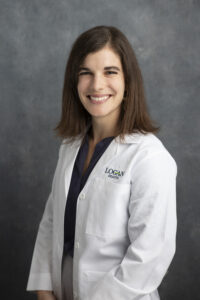Dr. Megan Cooper Appointed Director of Pediatric Rheumatology & Immunology Division at WashU
 Megan A. Cooper, MD, PhD, a physician-scientist recognized internationally for her work in pediatric immunodeficiencies and immune dysregulation, took the reins of the Division of Pediatric Rheumatology and Immunology at Washington University School of Medicine, St. Louis, as director this past fall. Her first mission as director was “to continue the robust division that we had,” she says. There are nine faculty members in that division, “so I was in a very lucky position,” she notes.
Megan A. Cooper, MD, PhD, a physician-scientist recognized internationally for her work in pediatric immunodeficiencies and immune dysregulation, took the reins of the Division of Pediatric Rheumatology and Immunology at Washington University School of Medicine, St. Louis, as director this past fall. Her first mission as director was “to continue the robust division that we had,” she says. There are nine faculty members in that division, “so I was in a very lucky position,” she notes.
Dr. Cooper has been a faculty member in the School of Medicine since 2010, and previously directed the Clinical Immunology Program, a collaboration among multiple specialties, including rheumatology and immunology, allergy and pulmonary medicine, hematology and oncology, as well as infectious disease. This month, she’ll step down from her post as associate director of the Medical Scientist Training Program to concentrate on her top priorities for the division.
“Here at Washington University, we have a long history, especially in pediatrics, of being highly supportive of physician-scientists, so I would like to grow that in our division,” Dr. Cooper says.
She also sees opportunities to enhance training in some of the newer initiatives in the pediatric rheumatology space, such as using ultrasound in more clinics, and adding clinics that specialize in specific diseases.
Dr. Cooper found herself drawn to pediatric rheumatology for two reasons. First, early in her medical education, Dr. Cooper realized she was attracted to the quality of resilience in children—“they just want to get better so they can go out and play!”
Then, during her doctoral studies as part of the MD/PhD program at Ohio State University, Columbus, she was mentored by oncologist Michael A. Caligiuri, MD, currently president of the City of Hope National Medical Center and a professor in the Division of Leukemia, Department of Hematology and Hematopoietic Cell Transplantation, studying the immune response of natural killer cells. During that time, she heard a presentation about a new gene therapy to cure severe combined immune deficiency. This line of investigation, she notes, “really sparked my interest in pediatric immunology.”
She completed her residency and then a fellowship in pediatric rheumatology at the Washington University School of Medicine, and was subsequently hired as a faculty member.
In her own laboratory, she and her team have—among other discoveries—identified and characterized new genetic defects of the immune system that lead to autoimmunity and immune dysregulation in children.
As part of her vision for the division, Dr. Cooper intends to grow its research enterprise “from basic to translational to clinical research because that is what will affect the lives of this population of children long term,” she says.
In addition, she hopes the specialty can “make more strides in finding specific molecular and biochemical markers of disease so we can give our patients more precision therapy,” she concludes.
Dr. Mitchell Forman Named Director of Nevada’s 1st Rheumatology Fellowship Program
 The Kirk Kerkorian School of Medicine at the University of Nevada, Las Vegas (UNLV), received accreditation for its first rheumatology fellowship program in January this year. Mitchell D. Forman, DO, FACR, FACOI, MACP, professor of medicine at the Kirk Kerkorian School of Medicine at UNLV and founding dean and dean emeritus of Touro University Nevada College of Osteopathic Medicine, was a prime mover in its development and has been named its director.
The Kirk Kerkorian School of Medicine at the University of Nevada, Las Vegas (UNLV), received accreditation for its first rheumatology fellowship program in January this year. Mitchell D. Forman, DO, FACR, FACOI, MACP, professor of medicine at the Kirk Kerkorian School of Medicine at UNLV and founding dean and dean emeritus of Touro University Nevada College of Osteopathic Medicine, was a prime mover in its development and has been named its director.
Dr. Forman expressed excitement about the new program: “As many times as I think about this, quite honestly, after 47 years of practicing rheumatology, I still get chills from thinking that this actually happened. This is so wonderful for the state and for our citizens.”
Dr. Forman’s hope is that the fellowship program will result in an increase in the rheumatology workforce and wider access to care for patients. “The time was right,” he notes, for this initiative, and he is quick to credit multiple people and factors that contributed to successfully establishing the fellowship program.
Dr. Forman was recruited to head the Clark County Medical Society for a second time as its president in 2022, and shortly thereafter received a call from the Kirk Kerkorian School of Medicine to return and work on starting the first rheumatology fellowship program in the state. As with any successful venture, he notes, the effort brought together many talented people:
- Financial support came from the Governor’s Office of Science, Innovation and Technology in the form of grants for two years;
- Kate Martin, MD, associate dean of graduate medical education (GME) also worked tirelessly on the project, as did the GME staff;
- Robert Lowe, MD, one of only two pediatric rheumatologists in the state, will rotate fellows in his practice for one-month stints; and
- Winn Chatham, MD, formerly director of clinical immunology and rheumatology at the University of Alabama Birmingham School of Medicine, joined the Kirk Kerkorian School of Medicine as chief of rheumatology. Dr. Chatham was also very helpful in the ACGME submission process, according to Dr. Forman.
The first two rheumatology fellows in the state’s history began work in July. Dr. Forman, who has experienced much satisfaction during his nearly 50-year career, stressed that one of the best parts of this accomplishment, as with others, is the ability to work in partnership/collaboration.
“Success,” he says, “is surrounding yourself with creative people who think likewise and who are very talented.”
Montana Now Has Its 1st Dedicated Pediatric Rheumatologist: Dr. Julie Campbell
 Access to specialty care in rural areas is often spotty or nonexistent. Montana, until this past October, was one of seven states in the country without a pediatric rheumatologist. Several different pediatric groups, such as Seattle Children’s, Colorado Children’s and the University of Utah have filled some of the gaps in care for young Montana patients with rheumatic diseases. That changed when Montana-born Julie Campbell, MD, returned to her home state and began her pediatric rheumatology practice at Logan Health Specialty Care, Missoula.
Access to specialty care in rural areas is often spotty or nonexistent. Montana, until this past October, was one of seven states in the country without a pediatric rheumatologist. Several different pediatric groups, such as Seattle Children’s, Colorado Children’s and the University of Utah have filled some of the gaps in care for young Montana patients with rheumatic diseases. That changed when Montana-born Julie Campbell, MD, returned to her home state and began her pediatric rheumatology practice at Logan Health Specialty Care, Missoula.
Dr. Campbell began her pre-medical education at Dartmouth College, Hanover, N.H., and her grandmother’s diagnosis of lupus during that time piqued her interest in rheumatology. Dr. Campbell applied for and was accepted into the University of Washington’s WWAMI (Washington, Wyoming, Alaska, Montana and Idaho) Medical School, where she spent time both in Montana and Seattle.
She then completed a pediatrics residency through the University of Washington, where she recalls being drawn to the care of patients with lupus during her rheumatology rotation. What cemented her decision to pursue pediatric rheumatology was observing how providers created a good partnership with their young patients, and how they emphasized individualized care.
“There’s a lot of thinking that goes into both the diagnosis and the treatment plans. It was really great watching providers go through that [process]. This is not cookie-cutter medicine, and I think the complexity of rheumatology is never ending,” she says.
To become a pediatric rheumatologist, she then completed a three-year fellowship at Seattle Children’s Hospital through the University of Washington. Her fellowship program received funding from the Arthritis Foundation with the support of the Ludlow-Griffith Foundation. After graduating, she moved back to her home state of Montana to start her career.
Since beginning her practice, Dr. Campbell notes that she often uses telehealth visits to connect with patients and their families if weather conditions and travel distances are prohibitive. “That was one of the silver linings of COVID,” she notes, “because we learned that telemedicine really does have its use.”
Already familiar with the pediatric Gait, Arms, Legs and Spine (pGALS) tool devised by Helen E. Foster, now professor emerita of Newcastle University in the U.K., Dr. Campbell says it was an easy jump to use the tool in a video visit. While the tool was initially developed to help pediatricians and primary care providers find appropriate referrals for suspected rheumatologic disease, she notes that it allows her to get a “good sense” of how patients are doing in between in-person visits.
Dr. Campbell says opening a practice in Montana has been a rewarding experience: “to truly have this dream come true, to be able to practice in Montana, be a part of my community and do the specialty that I love the most.”
Gretchen Henkel is a health and medical journalist based in California.



